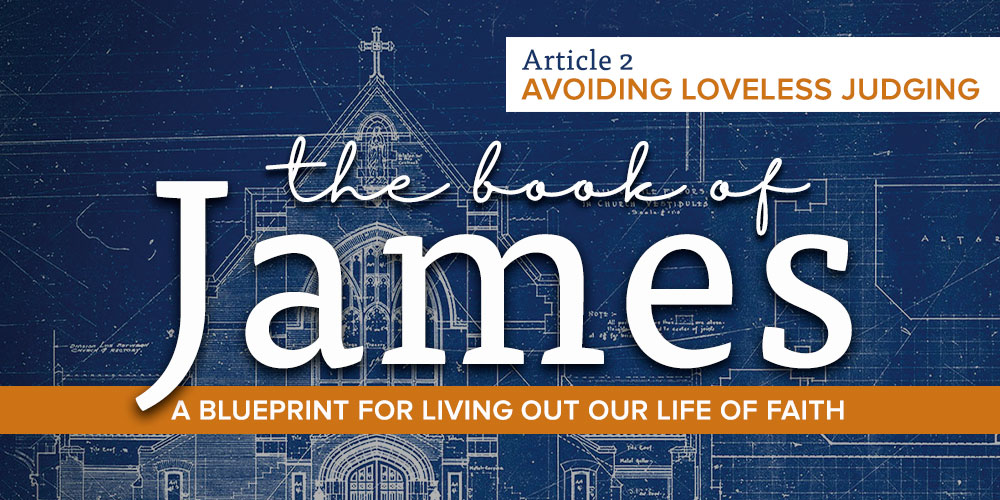 |
A blueprint for living out our life of faith
Did you know that the snail has teeth on its tongue? Under the microscope, hundreds of tiny teeth show up. With its serrated edge the snail’s tongue saws through tough stems with ease.
Some people have teeth on their tongues too. With their sharp tongues they criticize the conduct and cut down the character of others. Even believers can slip into this sin of uncharitable judging. No wonder James strongly reminds us in his blueprint for Christian living that faith is active in avoiding loveless judging.
Cause
Reading James’ words carefully, we find that he does not condemn all judging. To the government, God gives the right to judge the evildoer (Romans 13:3,4). To the Christian, he gives the right to admonish an erring brother (Matthew 18:15-17) and to judge a false prophet (1 John 4:1). Loving concern demands that we rebuke the sinner and admonish the wayward, trying to turn them to repentance. When sin and evil endanger a soul, Christians are to be softhearted, but not softheaded.
So, James doesn’t label all judging as evil, only that which “slander[s] one another” (4:11). Unkind, uncharitable judging that runs down a fellow believer’s reputation is not Christian. Often such criticism is sinful pride in action and an evil heart on parade. And pride is always selfish. It hopes to make itself appear better by making someone else appear worse.
We would readily agree that there is no room for uncharitable criticism among Christians bound together by the cord of faith. Yet what do we find at times in our own lives? Do we ever pass on that juicy tidbit at the card club, over the phone, across the dinner table that begins so innocently, “Did you hear . . . ?” So easily can we put pride’s magnifying glass on our neighbor, magnifying his faults while belittling our own.
Consequences
Uncharitable judging has some far-reaching consequences. James informs us, “Anyone who speaks against a brother or a sister or judges them speaks against the law and judges it” (4:11). Our Lord has told us to love our neighbor as ourselves. When we judge that person evilly, we are breaking that law of love. Even worse, we are putting ourselves in God’s place. God alone is the “Lawgiver and Judge” (4:12). He alone has power to save and to destroy. What superior wisdom or power do we think we possess that we can judge our neighbor in God’s place? Evil judging presumptuously seeks to put man above God’s law and to push God out of his place.
Cure
James offers no long argument showing we are unworthy to judge our brother. He doesn’t have to. All he has to do is ask, “Who are you to judge your neighbor?” (4:12).
We need a mirror more than a magnifying glass when it comes to judging. We need the honest mirror of God’s law to show us how often we fail. Above all, we need the gospel message to assure us that our God of love has already judged us clean through the blood of the Lamb.
Digging deeper
- Read 1 John 4:20,21 and note how closely love for others is related to love for God. We show our love for an invisible God by the way we love those who are visible at our side. God plainly reminds us that to love him means to love our fellow believers. Little or no love for them says something about our supposed love for God.
- Read Luke 6:37 and Romans 12:10 and note how James echoes the warnings of Jesus and his apostle. Jesus does not forbid all judging, only that which is uncharitable. The context in Luke 6 stresses mercy and forgiveness toward our neighbor. Paul stresses the opposite of sinful judging, urging brotherly love instead.
- What do Galatians 6:1 and Matthew 18:15 tell us to do instead of judging a fellow believer uncharitably? Both passages stress loving concern and personal approach to a fellow believer who has fallen into sin. Judgment is involved, but in love we are urged to want to bring the sinner to repentance.
This is an article in a continuing series on the book of James.
Author: Richard Lauersdorf
Volume 108, Number 8
Issue: August 2021
- Psalm 103: When you count your blessings
- Psalm 91: When God lifts you up on his lap
- Psalm 4: When you draw nearer to the end
- Psalm 42: When you ask, “Where is God when I’m hurting?”
- Psalm 32: When you need forgiveness
- Psalm 130: When rocks fall
- Bible study: Freedom in service
- What does this mean for me? Article 6
- Bible study: Spiritual gifts
- What does this mean for me? Article 5
- What does this mean for me? Article 4
- Bible study: Rejoice in your status!
- Bible study: Baptismal blessings
- What does this mean for me? Article 3
- What does this mean for me? Article 2
- Bible study: Gifts of tongues and miraculous healing
- What does this mean for me? Article 1
- Bible study: Jesus is everyone’s Savior
- Bible study: Love one another
- Bible study: Above all things!
- Bible study: The comfort of God’s providence
- The book of James: Waiting for Christ’s return
- Bible study: Precious grace
- The book of James: Active in using prayer
- Bible study: Rewards of grace
- The book of James: Active in showing love
- The book of James: Correctly evaluating riches
- Bible study: What’s going to happen on the Last Day?
- The book of James: Avoiding loveless judging
- Bible study: Interpretation practice
- The book of James: Taming the tongue
- Bible study: The Bible’s attributes
- Bible study: The importance of the family altar
- Bible study: God’s attitude is grace
- Bible study: The Bible’s account of Easter morning
- Bible study: Different types of sin
- Bible study: God’s inspiration
- Bible study: Giving God glory
- Bible study: Judge for yourself
- The book of James: Using the Word of Truth
- Bible study: The need for the Bible and worship
- Bible study: Citizens of two kingdoms
- The book of James: Active in good works
- The book of James: When battling temptation
- Bible study: God cares
- Bible study: God made the world
- The book of James: When facing trials
- Bible study: A loving God saved people from hell
- The book of James: A blueprint for living out our life of faith
- A Bible story just for me: Guilt
- Bible study: God provides victory over death!
- A Bible story just for me: Anxiety
- Bible study: God forgives and refuses to remember our sins
- A Bible story just for me: Grief
- Bible study: God helps those who cannot help themselves
- A Bible story just for me: Depression
- Bible study: God has not grown soft on sin
- Bible study: Only one path leads to God’s presence
- A Bible story just for me: Trauma
- A Bible story just for me
- Bible study: God wants me in heaven
- Bible study: The incarnation of our Lord






